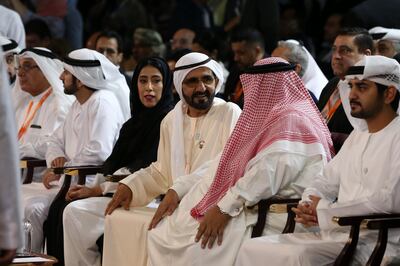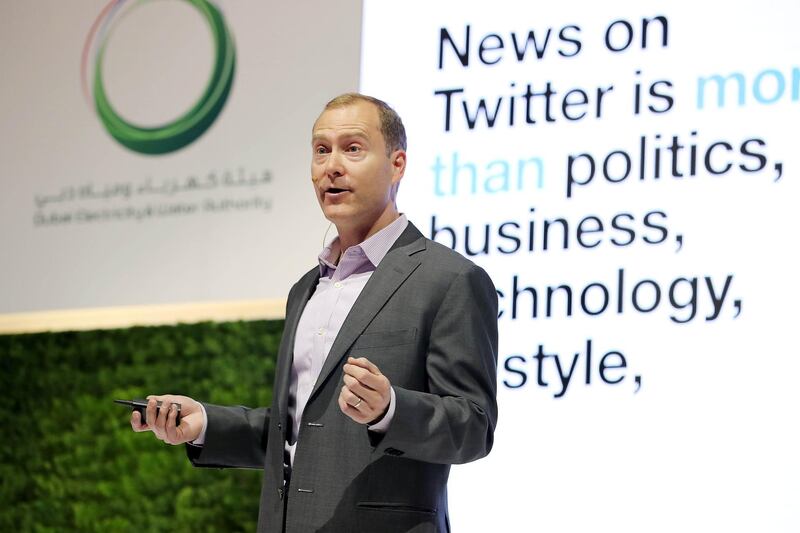The rise of artificial intelligence to generate fake news is fast evolving into an arms race between legitimate news outlets and sponsored websites seeking to distribute false information.
It is one of the biggest challenges of the digital new age, and was at the heart of the conversation on the first day of the Arab Media Forum, attended by journalists and government leaders including Sheikh Mohammed bin Rashid, Vice President and Ruler of Dubai.
From subtle manipulation of global elections through misinformation on social media, to more blatant distorted truths about celebrity lifestyles to feed demand, news has been one of the biggest stories of the past two years.
As the media landscape continues to change, forum experts speaking on impactful media trends said artificial intelligence can be used to help real news thrive, if used correctly.
“It is the most interesting development in making newsrooms more efficient that they are now,” said Lisa Gibbs, director of news partnerships at the Associated Press.
“Trust in media is becoming an arms race between those using artificial intelligence to generate fake news and those who would use it to create high quality news and call out this kind of information.
“That is the most fascinating relationship between news and AI and how that will work in the future.”

News stories currently generated with the help of AI and published by AP are usually data driven, and carry a disclaimer informing the reader that the technology has been used to help generate the content.
It is a tool that could become more familiar as news continues to migrate online.
“We don’t believe that the kind of human interest journalism that is popular can or will be replaced by AI,” said Ms Gibbs.
“If we can get our journalists away from producing articles about simple data, they can then focus on telling the personal human stories that take more time to produce and resonate with readers.
“We are going to have so many new tools available to journalists to verify their information and show how they disclose their methods in creating a story.”
_________________
Read more:
Governments must control the rise of artificial intelligence, experts say
Brussels considers new powers to battle 'fake news' during elections
Macron slams Facebook and Google as ‘too big to be governed’
__________________
Some of the most read snippets of fake news in 2017 included the conflicting death toll as a result of the Grenfell tower block fire in London, and the severity of a so called ‘force six’ hurricane to strike the Americas.
Both stories were shared millions of times on social media, but were wildly inaccurate.
Google is working with news organisations around the world to help journalists spot fake news and images that may not be genuine to help protect themselves and their readers.
In January, the tech firm revamped its ‘snippets’ feature, that appears at the top of a search results after asking Google a question, to help human raters more accurately identify hoaxes, false information and conspiracy theories.
Carlo Biondo, president of EMEA strategic partnerships at Google said there has been a big issue with fake news, quality information and their complexities.
“This has led to us starting a project called fact check, to attach a label to the search engine so people will know what information is trusted - It is an important interface,” he said.
“Google has launched the global news initiative, based on three principles to listen to the press and find out how Google can help it to be more successful using the web.”
Google has committed to train 4,000 journalists in the region by the end of 2019, and the use of new technological tools to encourage genuine news stories at the centre of that training.
“It is clear that privacy is important and that needs to be protected, but by exchanging data it is an easy way to give people the information that is most important to them,” Mr Biondo said.
“Data is the new order, and the currency of the future. Sharing data with the press is the best way to understand users and what they want from quality journalism.”
Representatives from Twitter were also speaking at the Dubai forum, extolling the virtues of the social media platform as the biggest source of breaking news.
In 2017, there were 330,000 live video broadcasts on Twitter, with the Middle East at the forefront of Twitter’s global growth, with 1.2 billion videos viewed on the platform daily.
“We have become the world’s watercooler where people gather to discuss the news of the day,” said Peter Greenberger, global director of news partnerships at Twitter.
“Twitter has become the go to source for news and information, and often the fastest and only global real time platform.”







